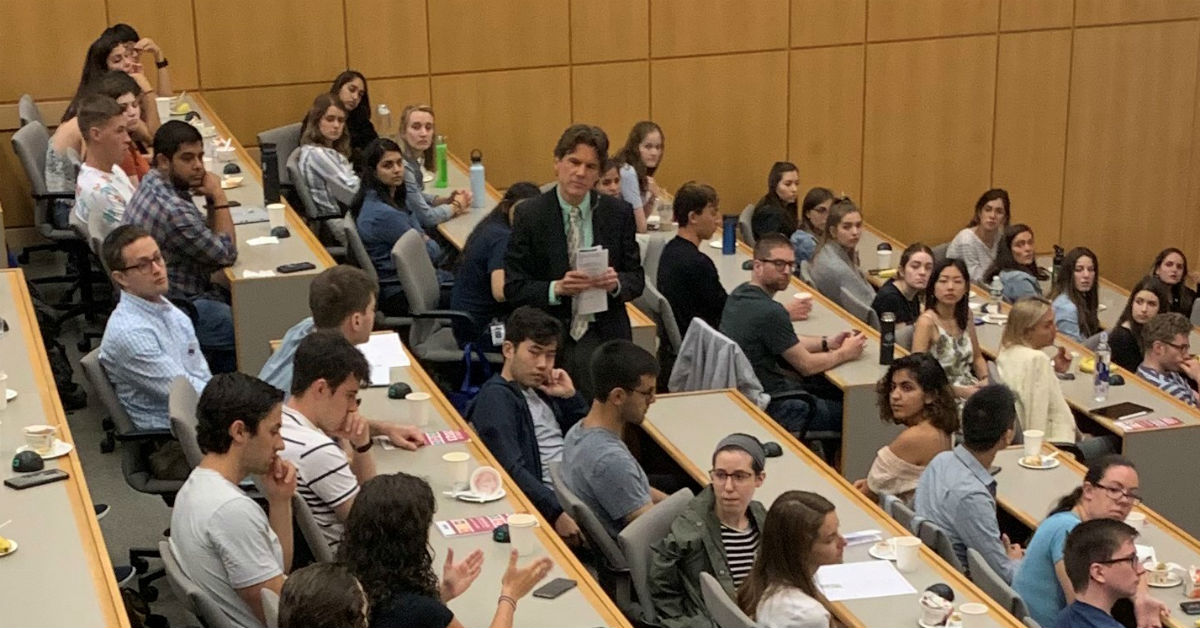
Dr. Gross discusses reflective writing with Einstein’s class of 2023
What does writing have to do with medicine?
This is a question I posed to the members of the Einstein Class of 2023 in Riklis Auditorium during their orientation a few weeks ago. They were about to spend a morning devoted to reflective writing—first hearing my talk and then attending a small-group session where, under a faculty member’s guidance, they’d have a chance to write and to share what they’d written.
Reflective writing? some of the students must have wondered. I thought I was here to study anatomy.
I began my talk, as I do every year, by reading aloud “First Patient,” a story published in Pulse–voices from the heart of medicine (pulsevoices.org), an online publication that I edit. Written by physician Rick Flinders, the story describes how the author, a liberal arts major at the time, dropped out of Berkeley to do a stint with the Peace Corps in Paraguay before attending medical school.
A teenage mother knocks on his door early one morning. She’s holding her dying baby. What should he do?
He puts the young mother, clutching her baby, behind him on his Honda 90 motorcycle (Peace Corps issue), and they take off toward the capital city, three hundred miles away, where he hopes that a hospital might save her infant.
Before they’ve gone far, the tenor of the young mother’s crying changes, and he knows what it means. He stops the motorcycle, gets off, and consoles her. They turn around and head back toward home.
“For the next half-hour,” the author writes, “I listened to the flood of a mother’s grief—ceaseless, inconsolable, uncomprehending. The grief was hers and that of millions of mothers before her, across countries and cultures and time.
“That sound, and her knock on my door that morning, has followed me through all the intervening years. It spoke to me when, after returning home, I changed my major from liberal arts to premed….”
“Why do we read stories like this?” I ask these brand-new medical students. “Why do we write them?”
These students know the answer. We all do. We read such stories because they are a part of our shared humanity. We want to know what others have gone through and to see how it compares with our own experiences. We read to get new perspectives on people and events that we’ve known, that we might someday know, or that we may never encounter.
We write such stories because they demand to be shared. Because their truth moves us. Because we want to teach others.
During their week-long orientation, the members of every new Einstein class create their own physician’s oath. They will recite this oath when they graduate. This oath is invariably beautiful and idealistic. The oath will talk about serving their patients with open hearts and without judgment. The oath will talk about being kind in manner, compassionate in tone, and generous in spirit. About being doggedly conscientious and always putting patients first.
I suggest to the students that this oath they are creating is, in effect, a destination and a path being charted by their best selves.
At the same time, students acknowledge a worry: that the pressures of their medical education will change them. They worry about becoming less kind, less feeling, more impatient. Research gathered over the years suggests that their concern is warranted.
“What, then,” I ask, “can you do to make sure that you stay on course—that you reach your destination? If the liberal arts major in this story had enrolled in your medical school, what would you do to make sure that his best self withstood the rigors of your training?”
I suggest that one way—not the only way, but one way—is to engage in reflective writing, which enables them to observe their journey through the eyes of their best selves.
This might involve writing about a patient who moved them. A resident who handled a troubling situation well, or one who handled it poorly. A time when they witnessed an injustice. A time when they did the right thing—or wished they had.
In their small groups, the students are encouraged to write for twelve minutes. They’re given prompts; they are also told that they are free, instead, to write about whatever’s on their minds that day.
The students, who are getting to know their classmates for the first time, and many of whom have moved to the Bronx from far away, write about the challenge of undertaking this lofty ambition, about feeling like impostors (Me? A doctor?), about their fear of failure—and about personal challenges that they and their family members have faced. And they share their stories with one another.
In doing so, the students learn something about the humanity they share with their fellow students, a shared humanity that we hope and expect they will bring to their interactions with patients. They will one day see their patients express vulnerability. They are learning that physicians, too, can be vulnerable. Physicians may, at times, be required to mask their feelings, but their humanity requires them to find safe spaces where they can slip their masks off. Those safe spaces can include settings in which they can write down their thoughts. They can also include exam rooms, with their own patients.
I tell students this is not the last time they will be writing at Einstein. During some courses they will be expected to write reflective pieces about their experiences as medical students. These assignments are to help them grow, and also to help them remain the same. Ideally, reflective writing will enable them to hold onto their best selves—the ones who created an oath about the consummate doctors they all want to become.

